Students can Download English Lesson 6 On the Rule of the Road Questions and Answers, Summary, Activity, Notes, Samacheer Kalvi 12th English Book Solutions Guide Pdf helps you to revise the complete Tamilnadu State Board New Syllabus and score more marks in your examinations.
Get a Practical Study with the help of Samacheer Kalvi 12th English Grammar to make learning language much easy for you and score good grades in exams.
Tamilnadu Samacheer Kalvi 12th English Solutions Prose Chapter 6 On the Rule of the Road
Warm-Up
(a) From the pictures given below, identity the actions that may cause inconvenience and discomfort to others. Discuss.
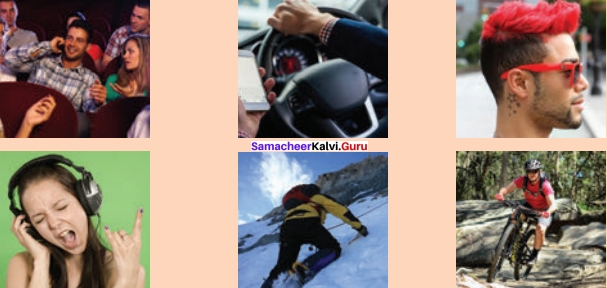
Answer:
Using mobile phones, listening to loud music, and driving recklessly will cause inconvenience and discomfort to others.
(b) Classify these pictures to show what they depict-Personal freedom/Public liberty.
| Personal freedom | Public liberty |
| colouring the hair red | |
Answer:
| Personal freedom | Public liberty |
| colouring the hair red | Using a mobile phone |
| listen to music | driving recklessly on the road |
| cycling | |
| mountain climbing |
Samacheer Kalvi 12th English On the Rule of the Road Textual Questions
1. Answer the following questions in one or two sentences each.
Question (a)
Why did the lady think she was entitled to walk down the middle of the road?
Answer:
The lady thought that she was entitled to walk down the middle of the road as she had got the liberty to do so.
Question (b)
What would be the consequence of the old lady’s action?
Answer:
If the pedestrian takes to the road, the cars have to take the pavement to drive on. The lady’s action would result in universal chaos.
![]()
Question (c)
What does the ‘rule of the road’ mean?
Answer:
‘Rule of the road’ means in order to preserve the liberties of all, the liberties of everybody must be curtailed.
Question (d)
Why should individual liberty’ be curtailed?
Answer:
Individual liberty must be curtailed in order that everyone may enjoy a social order which makes individual liberty a reality.
Question (e)
How would a reasonable person react when his actions affect another person’s liberty?
Answer:
A reasonable person would accommodate his liberty to the liberties of others.
Question (f)
Define Liberty as perceived by the author.
Answer:
Liberty is an accommodation of interests. It is a social contract rather than a personal affair,
Question (g)
According to the author, what are we more conscious of?
Answer:
According to the author, we are more conscious of the imperfections of-others than of our own.
Question (h)
What is the foundation of social conduct?
Answer:
A reasonable consideration for the rights or feelings of others is the foundation of social conduct.
Question (i)
How can we sweeten our life’s journey?
Answer:
We can sweeten our life’s journey by the habit of commonplace communion that makes up the great sum of life.
Question (J)
What does the traffic policeman symbolize?
Answer:
The traffic policeman symbolizes not tyranny but liberty.
Additional Questions
Question (a)
How does individual liberty become social anarchy?
Answer:
When an individual does not follow the rules of the road, he interferes with others. Everyone will get into everyone else’s way and thus individual liberty will become social anarchy.
Question (b)
What will happen if the policeman does not interfere with traffic?
Answer:
Universal chaos occurs when an individual pays more attention to his personal liberty alone and ignores the liberty of others.
Question (c)
When can one enjoy a social order?
Answer:
When one submits to a curtailment of private liberty, one can enjoy a social order. Such a social order makes one’s liberty a reality.
![]()
Question (d)
Why does the author say liberty is a social contract?
Answer:
Liberty is not a personal affair but a social contract. It is an accommodation of interests.
Question (e)
What are we liable to forget?
Answer:
We are liable to forget that there are a lot of people in the world and we have to accommodate our liberties to their liberties.
Question (f)
What are we often conscious of?
Answer:
We are often conscious of the imperfections of others than of our own when it comes to accommodation of interests.
Question (g)
How do we declare ourselves civilised or uncivilised?
Answer:
It is in the small matters of conduct, in the observance of the rules of the road, that we pass judgement upon ourselves and declare if we are civilised or uncivilised.
2. Answer the following questions in three or four sentences each.
Question (a)
What is ‘liberty’ according to the old lady?
Answer:
According to the Russian old lady, liberty is the right to walk in the middle of the road. She is liberty-drunk. She wasn’t aware that if the pedestrian chooses to walk down the middle of the road, then the end of such liberty would be a universal chaos.
Question (b)
How would ‘liberty’ cause universal chaos?
Answer:
When liberty is used without accommodating the interests of others, it results in universal chaos. Everybody would be getting in everybody else’s -way. Nobody would get anywhere. Individual liberty would become a social anarchy.
Question (c)
Why is there a danger of the world getting ‘liberty drunk’?
Answer:
Similar to the Russian old lady many people are liberty-drunk. Many think that a traffic policeman is a symbol of tyranny. Being in a hurry, the people who are crazy driving their cars . at break-neck speed think that the traffic policeman interferes with their right to free use of highway.
Question (d)
‘Curtailment of private liberty is done to establish social order’ – Do you agree?
Answer:
Yes, curtailment of private liberty is done to establish social order. Liberty is not a personal affair only, it is a social contract. There are a lot of people in the world who need to accommodate their liberty to the liberties of others. A reasonable consideration of the rights or feelings of others in the foundation of social conduct. When one has submitted to the curtailment of private liberty, one may enjoy a social order which makes his liberty, a reality.
3. Answer each of the following in a paragraph of 100-150 words.
Question (a)
What do you infer from Gardiner’s essay ‘On the rule of the Road’?
Answer:
Gardiner’s essay “On the rule of the Road’ emphasises the fact that liberty is not a personal happening but a social commitment. One can enjoy one’s liberty to the extent that it does not disturb others. For example, one has got the complete liberty to choose his dress, dye his hair, go to bed late, or get up early. In fact, one has got the liberty to practice the trombone till midnight when he is alone.
The same cannot be done in the streets at night as it disturbs the liberty of his neighbours to sleep in quiet. It is quite essential that one has to accommodate one’s liberty to other liberties. The foundation of good social conduct is a reasonable consideration of the rights or feelings of others. Thus one can declare himself as civilized. It is this consideration for others which sweeten our life’s journey.
![]()
Question (b)
Explain in your own words, “What freedom means?”
Answer:
Freedom is not the absolute right of an individual. It is not a personal affair only but a social contract. It is an accommodation of interests. One may exercise freedom in matters pertaining to choice of hair-cut, clothes, sandals, and sleeping habits. There are a thousand little things for which one can use freedom and be wise or otherwise. But beyond that kingdom of freedom, one’s freedom of action is qualified by other’s freedom. One might use a trombone from midnight till three in the morning provided it is done in Mount Everest and not where one’s own family members are asleep. One’s right to play on trombone must not interfere with the liberty of neighbours to sleep in quiet. A reasonable consideration for the rights or feelings of fellow humans is the foundation of social conduct.
Question (c)
“My right to swing my fist ends, where your nose begins.” Elucidate with reference to, ‘On the Rule of the Road’.
Answer:
Liberty is doing what we like we can wax our mustache. We can wear an overcoat or sandals. We can eat whatever food we like we have the choice to select our favourite writers for reading. All these are considered to be personal liberty. It does not disturb others in any way but when there arises a situation where our personal liberty disturbs others it is very essential to curtail our liberty. That is why it is said “My right to swing my first ends where your nose begins”, only when we have reasonable consideration for the rights of others good social conduct can be maintained.
Question (d)
Civilization can only exist when the public collectively accepts constraints on its freedom of action – Explain.
Answer:
Human beings, by nature, are quick to find fault with the imperfections of others. They don’t usually realize the truth that they have to accommodate their liberty to the liberty’ of others. A reasonable consideration for the rights and feelings of others is the foundation of social conduct. It is in small matters of conduct, in the observance of the rules of the road, that we pass judgment on ourselves. We assess ourselves as civilized or uncivilized.
We are civilized if we enjoy our rights without violating the rights of others or eroding into the privacy of others. It is the little habits of commonplace interaction that make up the great sum of life and sweeten or make bitter the journey.
In a civilized society, the public collectively accepts the fact that freedom is an accommodation of the interests of others. It means curtailing a part of one’s own liberty to the liberty of others. So, it is true that civilization can only exist and prosper when the public collectively accepts constraints to its freedom of action.
Vocabulary
Pronunciation – Functional Stress
(a) Now the teacher will read the following words. Listen carefully to the stress in each word. Write against each word whether it is a noun or a verb and mark the stress.
| ‘contract | con’tract |
| ‘conduct | con’duct |
| ‘object | ob’ject |
| ‘subject | sub’ject |
| ‘present | pre’sent |
| ‘desert | de’sert |
| ‘project | pro’ject |
| ‘refuse | re’fuse |
| ‘address | ad’dress |
Answer:
| ‘contract (n) | con’tract (v) |
| ‘conduct (n) | con’duct (v) |
| ‘object (n) | object (v) |
| ‘subject (n) | subject (v) |
| ‘present (n) | pre’sent (v) |
| ‘desert (n) | de’sert (v) |
| ‘project (n) | project (v) |
| ‘refuse (n) | re’fuse (v) |
| ‘address (n) | ad’dress (v) |
American And British English
(c) Some British English words are given in column ‘A’. Write their corresponding American English word is Column ‘B.’
| British | American |
| pavement | sidewalk |
| pull over | |
| waistcoat | |
| chips | |
| flat | |
| ground floor | |
| underground | |
| queue | |
| windscreen | |
| indicator | |
| timetable | |
| post | |
| holiday | |
| autumn | |
| lift | |
| happy | |
| fully |
Answer:
| British | American |
| pavement | sidewalk |
| pull over | sweater |
| waistcoat | vest |
| chips | french fries |
| flat | apartment |
| ground floor | first floor |
| underground | sub-way |
| queue | line |
| windscreen | windshield |
| indicator | turn signal |
| timetable | schedule |
| post | |
| holiday | vacation |
| autumn | face |
| lift | elevator |
| happy | happy |
| fully | totally |
(d) Similarly there is a difference in the spelling of certain words between American and British English. In Column ‘A’ words are spelled in American. Write down the corresponding British English spelling for those words in column ‘B\ (The first one is done for you)
| A | B |
| odor | odour |
| program | |
| parlor | |
| apologize | |
| color | |
| check | |
| theater | |
| gray | |
| behavior | |
| humor | |
| labor |
Answer:
| A | B |
| odor | odour |
| program | programme |
| parlor | parlour |
| apologize | apologise |
| color | colour |
| check | cheque |
| theater | theatre |
| gray | grey |
| behavior | behaviour |
| humor | humour |
| labor | labour |
Listening Activity
Listen carefully to the story being read out and answer the questions.
A boy was flying a kite with his father. He was excited to watch the kite soar high and asked his father, “What kept the kite up?” Dad replied “The String”. The boy said “No dad, the string is holding the kite down.” The father suddenly broke the string, the kite came crashing down. Now the boy understood, what was holding the kite up. This is true in life as well. We are advised to follow a set of rules or a prescribed code of conduct to enable us to reach our full potential.
However, very often we hear the phrase “I want to be free.” If you take the train off the track, it is free. But where would it go? If each one of us follows our own traffic rules and drive on any side of the road what would you call it? Freedom or chaos? By observing rules we are actually gaining freedom. This is what discipline is all about.
![]()
Question 1.
According to the father, what kept the kite up?
(a) the kite itself
(b) air
(c) the string
(d) father’s skills
Answer:
(c) the string
Question 2.
The string helped the kite to ______
(a) withstand the pressure
(b) break free
(c) crash
(d) soar high
Answer:
(d) soar high
Question 3.
To realize our full potential, we should ______
(a) obey our elders
(b) follow a set of rules
(c) work hard
(d) plan well
Answer:
(b) follow a set of rules
Question 4.
A train should go on the ______ to reach its destination.
(a) track
(b) line
(c) road
(d) path
Answer:
(a) track
Question 5.
Taking freedom into our own hands will lead to ______
(a) self-discipline
(b) chaos
(c) a code of conduct
(d) freedom
Answer:
(b) chaos
Question 6.
The main idea of the passage is ______
(a) the art of flying kites
(b) father’s advice to his son
(c) the importance of discipline
(d) the right to freedom
Answer:
(c) the importance of discipline
Speaking Activity
(a) Everybody enjoys holidays but, when it comes to safety ‘There is no holiday for Safety’. Discuss in groups what safety measures one should take while driving a car/ two-wheeler.
Group A:
While riding a bike, the rider should wear a helmet. If there is a pillion rider, he/she should also wear a helmet. When the signal is yellow, one must stop the vehicle as a red signal will follow soon. Don’t ride or drive with breakneck speed. If somebody tries to cross the road suddenly, there could be a fatal accident. Before leaving the home, check the tyre pressure, adequacy of petrol or diesel or electricity if it is an electric bike/scooter. Thus, you can ensure safety by adopting the above strategies.
Group B:
If you plan to travel by car, leave at least one hour early to avoid peak hour traffic. Wear a seat belt. Before overtaking ensure if the vehicle ahead of you wishes to take a ‘U’ turn or not. If you wish to take a right turn or a left turn using the indicator to warn the following vehicle of your intended change in the direction of travel. If you tend to travel near a school, don’t speed up, look on either side to verify if children are trying to cross the road. Don’t honk near hospitals and schools. If there is an unmanned level crossing, park your car 10 meters away from the level crossing, check for the movement of the train on either side. Even if the train is seen far away, wait for the train to pass by.
(b) Your school has arranged for a road safety campaign, Share a few ideas with your classmates which can be used during the campaign. For example ‘Speed thrills but kills’.
The following are some interesting slogans to be used in the road safety campaign.
- Drive as if every child on the road is your own.
- A spill, a slip, a hospital trip
- Start early, drive slowly, reach safely
- An accident would cripple your income
- Safety protects people
- Safety starts within you
- Risk prevention is better than cure
- Drowsy driving is impaired driving
- Fast drive’ could be the last drive
- Don’t lose your head to gain a minute, you need your head Your brains are in it
- Hug your kids at home but belt them in the car
- Safety first because accident last
- Chance takers are accident makers
- Accidents hurt but safety doesn’t
- Speed kills, slow down
- Be cautious, nearly 40% of victims in road accidents are pedestrians
- Sober up, drunk driving kills
Reading
Cyber Safety
Given below is a text on “Cybersafety” developed from the inputs received from Crime- Branch Crime Investigation Department (CBCID), Tamil Nadu dated: 05.12.2018. Read the text and answer the questions that follow.

Question 1
How should teenagers guard against cybercrimes?
Answer:
- Desist from interacting with strangers on social media and never meet strangers in person pursuant to social media chat/interaction.
- Avoid having your picture as a profile picture. Even if you choose to have one, do so while restricting those persons who can see your profile picture.
- Do not download software’s/Apps from unknown sources. Do not download unnecessary apps on the devices. Be a member of a social media group or WhatsApp group only if you know the majority of members in it and also if it is relevant to be part of the group. Do not believe and blindly share messages on social media without verifying the facts.
- Keep front camera of mobile phones, laptops, etc., closed when not used. For Example, Stickers may be used to close the camera and to avoid remote access of the front camera.
![]()
Question 2
What should we do to ensure Safe Surfing?
Answer:
- Use a secure browser.
- Do not surf unsafe websites. A website with a URL starting with https:// is a secure website. If the website URL starts only as http://, it is unsecure.
- Avoid clicking on links from unknown emails/pop-ups.
- Do not enter passwords when connected to a public network (WiFi in Railway station or Airports)
- Always use a computer in which an updated Anti Virus is installed.
Question 3
What are the details not to be revealed in the public domain?
Answer:
- Any Passwords
- Bank account /credentials
- Credit card/Debit card details
- Personal mobile number
- Date of Birth
- Any details which would help to track your routine activities
Question 4
What should parents do to ensure the safety of children in cyberspace?
Answer:
- Set a fixed time during which children are allowed to surf the internet.
- Always place the computer in that part of the house, which is visited most often by everyone. Don’t keep the computer in a secluded part. Talk with the children and educate them on the websites that they are allowed / not allowed to visit.
- Be “Friends” with the children’s social media account so that their activities are monitored.
- Install an Anti Virus with parental control in the computer.
- Make it a habit to check to browse history/hidden files, apps installed, etc., on the computer/ device to monitor the activity of the children.
Question 5
Should children be discouraged from playing online games?
Answer:
Yes, the following steps can be followed to discourage children from playing online games.
- Encourage children to play outdoor games.
- Monitor closely if they are found playing a single game for long hours.
- Watch out for early signs of addiction to games such as
- Decreasing Academic activity 4 Less times spent with family
- Loss of interest in things previously enjoyed.
- Lack of sleep / Sore Eyes
- Headaches
- Create awareness about the ill-effects of dangerous online games.
Questions:
Question 1.
Which of the following should one avoid while using social media? Tick against the correct options.
Answer:
- Interacting with strangers on social media
- Avoid posting your picture as a profile picture
- Forwarding Whatsapp messages without verifying facts
- Use a secure browser
- Entering passwords while using a public network
![]()
Question 2.
How can we identify insecure websites?
Answer:
If the website URL starts only as http://, it is insecure.
Question 3.
Mention any three details that should not be revealed in the public domain.
Answer:
- Password
- Bank account details
- Personal mobile number
Question 4.
What should parents do to ensure cyber safety for their wards? (Any three points)
Answer:
Set a fixed time for viewing the internet
Keep the computer in a place where the content being viewed can be monitored by anyone Educate children on safe and unsafe sites.
Question 5.
Why is it not advisable to play online games?
Answer:
- They could swindle the family fortune
- Online games distract children from studies
- Children tend to spend less quality time with family members.
- Children tend to develop eye problems
Question 6.
Pick out words which mean the same as
Answer:
- stop doing something (para 1) – desist/avoid
- place or fix (para 2) – having
- not protected (para 2) – insecure
- keep a check on (para 3) – monitor
Grammar
Agreement of the subject with the verb
Task 1
I. Choose the correct option and complete the sentences.
- Manoj ________ (was, were) present along with his parents.
- Each of these boys ________ (has, have) passed.
- Neither Lekha nor Leela ________ (has, have) been selected.
- Every man, woman, and child ________ (was, were) happy.
- One of the machines ________ (is, are) defective.
- A number of books ________ (is, are) missing.
- Seker or his brothers ________ (has, have) done it.
- To make a promise and then not to keep it ________ (is, are) dishonesty.
- One of the other of those men ________ (has, have) lodged a complaint.
- TO. Each leaf and each flower ________ (was, were) stripped off the tree.
Answers
- was
- has
- 3. has
- were
- is
- are
- have
- is
- has
- was
Task 2
II. Identify the errors in each of the following sentences and rewrite them correctly.
Question 1.
Either Shyam or Ram have to pay the fine.
Answer:
Either Shyam or Ram has to pay the fine.
Question 2.
Abdul as well as Karim deserve praise.
Answer:
Abdul as well as Karim deserves praise.
Question 3.
Ten thousand rupees a month are an insufficient income.
Answer:
Ten thousand rupees a month is an insufficient income.
Question 4.
Many a student were awarded at the function.
Answer:
Many a student was awarded at the function.
Question 5.
Neither Veena nor her sisters have been informed of the accident.
Answer:
Neither Veena nor her sisters have been informed of the accident.
Question 6.
Mithra as well as her daughters enjoy singing.
Answer:
Mithra as well as her daughters enjoys singing.
Question 7.
You, who is my friend, should help me.
Answer:
You, who are my friend, should help me.
Question 8.
My scissors is missing.
Answer:
My scissors are missing.
Question 9.
A variety of pleasing objects charm the eye.
Answer:
A variety of pleasing objects charms the eye.
Question 10.
Sixty miles are a long distance.
Answer:
Sixty miles is a long distance.
Writing
Describing a process
Task 1:
Preparation of apple juice
You plan to delight your parents and sister, serving them chilled apple juice. Here is the process:
(Complete the sentences with the right form of the verbs)
Four or five apples (1) ______ (take) and (2) ______ (wash) well. They (3) ______ (wipe) dry and cut into pieces of medium size. The seeds (4) ______ (remove). Then the apples (5) ______ (put) into the mixer. Some milk (6) ______ (add) .The apples(7) ______ (crush) and a fine liquid (8) ______ (obtain). This liquid (9) ______ (filter) and the juice (10) ______ (store) in the refrigerator. It is (11) ______ (take ) out whenever needed, and after adding sugar, it (12) ______ (sen e) in cups.
Answer:
- should be taken
- washed
- should be wiped
- should be removed
- should be put
- should be added
- should be crushed
- will be obtained
- should be filtered
- should be stored
- taken
- is served
Task 2:
Installing a computer
The description of installing a computer in your study room is given in the form of jumbled sentences. Rearrange the sentences in the right order and form a coherent paragraph.
- Once you connect the CPU, connect the keyboard and mouse.
- Before turning on the power, check that all parts are connected to the CPU.
- First, open the box and take out the computer parts.
- Plug both the computer and the monitor with a power cord.
- Set the computer on a table or flat surface.
- Finally, turn on the power.
![]()
Task 3:
Attempt a description of the following processes, in about 100 words each, either using the imperative or the passive.
Question 1.
Preparing your favourite dish
Answer:
- Finely chop one medium size onion, 1 to 2 green chilies, half-inch ginger, and some coriander leaves.
- One must keep aside 8 to 10 curry leaves, 10 to 12 cashew nuts, 1 teaspoon chana dal, and 1 teaspoon of urud dal.
- Heat a pan or Kadai. Add one cup rava and roast at a low flame, until the aroma of roasted rava arises.
- Shift the roasted rava to another plate.
- In a pan, heat 2 tablespoons of ghee or oil and add mustard seeds. Wait until it crackles.
- Then add cumin seeds and chana dal and fry them until brown.
- Add cashews and roast till they become golden colour. Now add finely chopped onions and saute them till they become translucent.
- Now add green chilly, ginger, curry’ leaves. Saute for a minute. Add two and a half cups of water and add salt to taste.
- Wait until the water boils and add the roasted Rava in four or five batches. Keep stirring and mix well under low flame.
- The rava will absorb the water and will be cooked.
- Keep on stirring until all the water is absorbed by the rava and then turn off the flame.
- Serve the delicious upma with coconut chutney or sugar.
Question 2.
Organising a birthday party at your house
Answer:
Organising a birthday party especially for young children could be great fun.
- Shortlist the names of invitees.
- Write or print as many invitation cards as necessary,
- Place them inside the cover and write the names on each cover.
- Decide on the items to be served to the invitees such as juice, cakes, ice-cream, candies etc.
- Decorate the home with colour flags, balloons, etc.
- Decide on the games to be played.
- Along with food items procure gift items to be given to children who come to honour the child at the birthday party.
- Either has a photographer or videographer to record the event.
- Now go ahead with the plan, you will have a wonderful birthday party.
Question 3.
Sending a letter by courier service
Answer:
- Write the letter, fold it, and place it inside an envelope.
- Paste the right end of the envelope and write your address at the left-hand bottom.
- Write the addressee’s name and address in the middle of the envelope.
- Take it to the courier office.
- Write on top of the envelope “By Courier”.
- Get it weighed.
- The front desk personnel will ask you to pay an amount according to the weight of the envelope and the distance it has to travel.
- Pay the money and get the invoice.
- Now the courier is on its way to the intended destination.
Question 4.
Obtaining a demand draft from a bank
Answer:
- It is a very simple process.
- Go to any nationalized bank and ask for a challan to fill in details such as the beneficiary’s name, date, amount, commission to be paid.
- One can turn the challan leaf to find the Tamil version of the challan to be filled,
- Total the amount and the commission and fill the challan.
- Draw a self-drawn cheque and attach it along with the DD challan.
- The bank will deduct the money from your account and give a demand draft to you.
- If you don’t have an account, the commission amount maybe a little extra.
On the Rule of the Road About The Author
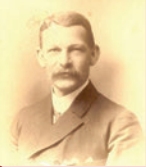
Alfred George Gardiner was a British journalist and author. He was a prolific essayist and his style and subject matter easily qualified him to be categorized as what the English would call a very civilized gentleman. His essays include ‘On Habits’, ‘On Being Tidy’, and ‘On Talk and Talkers’. ‘On the Rule of the Road’, was included in one of Gardiner’s compilations titled “Leaves in the Wind’ and was published under his pseudonym “Alpha of the Plough”.
On the Rule of the Road Summary in English
Introduction
On the rule of the road, A. G. Gardiner emphasizes the necessity of certain constraints on individual liberty if society is to function in a genuinely civilized manner.
Social awareness
A plump old lady was walking with her basket in the middle of the road in Petrograd. It created great confusion with the traffic. Even her own life was in danger. Somebody pointed out to her that the pavement was meant for the pedestrians. Her reply was that she enjoyed liberty and could walk anywhere she liked. She did not realize that her liberty or such unrestrained freedom could lead to an all-round disorder. If everybody interferes with the liberties of others, nobody would be able to enjoy liberty. This could lead to social anarchy.
![]()
Liberty drunk public
In the modem world, people are liberty dunk like that old lady. Therefore, it is important to remind them what the mle of the road means. It means that to preserve the liberties of all, everybody’s liberties must be reduced. He makes his point clear with an example of a traffic policeman. The traffic policeman is not a symbol of tyranny but of liberty. An unreasonable man will be annoyed by the interference of the traffic policeman. If the policeman stops a man in a hurry, he will feel that his liberty has been injured by violence. A reasonable man will surely think him to be the right man to do so. If he does not interfere with him, he would interfere with none. It would lead to chaos. Then nobody would be able to cross the road. Therefore, one’s liberty has to be curtailed to create social order and make liberty real.
Personal liberty vs Public liberty
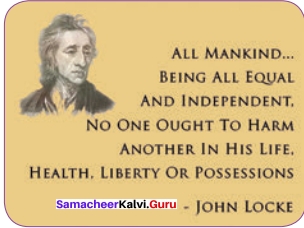
Liberty is not only a personal affair but a social contract too. It requires an adjustment of our interests. There are matters of a private kingdom which does not touch anybody else’s liberty’. In this kingdom, one can follow one’s own fancy and ask no one’s permission. For example, one may follow any religion or one may marry a dark or fair lady. One may dye one’s hair or do whatever one may like with his hairstyle. These actions do not interfere with the liberties of others. But when one comes out of the kingdom of one’s personal liberty of action, becomes qualified by other people’s liberty. For example, one may like to play the guitar. But one should do the practice mildly to accommodate one’s liberty to other liberties. But most often people forget this. People look to the faults of others but forget their own. A reasonable consideration for the rights or feelings of others is the foundation of social conduct
Equal rights for small and big people
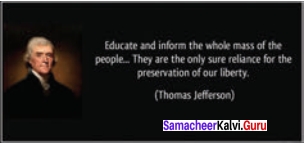
The rights and liberties of small people are as important as those of small nationalities. Gardiner here condemns the attack of Germany on Belgium. In World War-II, Germany, a super military power overran the small and poorly equipped Belgium. He also criticizes the aggressive and bullying nature of some people and nations of the world. He called them an ugly specimen of a civilized world.
Small actions with big impact
Small actions of conduct count more. By these actions, like observing or not the rules of the road, we can be civilized or uncivilized. It is the little habits of commonplace intercourse that make up the great sum of life sweeter or make the journey bitter.
Conclusion
A.G. Gardiner illustrates with interesting examples of how social anarchy could be prevented by adhering to rules of the road. In a way, adhering to the rules of the road will not only retain a social order but also prevent fatal accidents on the road and embarrassing traffic jams.
On the Rule of the Road Summary in Tamil
முன்னுரை
_ ‘On the Rule of the Road’ (“சாலை விதியைப் பற்றி”) என்ற பாடத்தின் வாயிலாக கார்டினர், நம் தனி சுதந்திரத்தில் சில கட்டுப்பாடுகளை வகுத்துக் கொண்டால் நம் சமுதாயம் உண்மையாக நாகரிகம் நிறைந்ததாக செயல்படும் என்கிறார்.
சமூக விழிப்புணர்வு:
பெட்ரோகாட் நகரத்தில் பருமனான வயது | முதிர்ந்த பெண்மணி ஒருவர் தன் கையில் ஒரு | கூடையுடன் நடுரோட்டில் நடந்து கொண்டிருந்தார். இது சாலை போக்குவரத்தை பெரிய குழப்பத்திற்கு | உண்டாக்கியது. அவர் உயிருக்கே ஆபத்தாக இருந்தது. | நடைபாதையில் நடக்குமாறு சிலர் கூறிய போது, தான் | சுதந்திரத்தை விரும்புதால் தான் எங்கும் நடப்பதற்கு | உரிமை உண்டு எனப் பதிலளித்தார். அத்தகைய சுதந்திரம் மொத்தத்தில் குழப்பத்தையே ஏற்படுத்தும் என்பதை அவர் உணரவில்லை. ஒவ்வொருவரும் அடுத்தவரின் தனி சுதந்திரத்தில் தலையிட்டால் எவராலும் சுதந்திரத்தை அனுபவிக்க முடியாது. இது சமூக அராஜகத்தை உண்டாக்கும்.
சுதந்திர போதையில் தள்ளாடும் பொதுமக்கள்:
தனிச் சுதந்திரம் என்ற அபாய நோக்கமானது இக்காலத்தினரிடயே அந்த வயதான மூதாட்டி போல் தொற்றிக் கொண்டுள்ளது. ஆதலால், சாலை ஒழுக்கத்தை அவர்களுக்கு நினைவுபடுத்துவது முக்கியமான கடமையாகிறது. அதாவது அனைவரின் சுதந்திரத்தை பாதுகாக்கும் பொருட்டு அவர்களின் சுதந்திரத்தில் எல்லை வரையறுக்கப்படுகிறது. ஆசிரியர் இந்த கருத்தை தெளிவாக்க சாலை பாதுகாப்பு காவல்காரரை உதாரணமாகக் கொள்கிறார். சாலை பாதுகாப்பு காவலர் எதேச்சதிகாரத்தின் அடையாளம் அல்ல. அவர் உரிமையின் சின்னமாவார். இதைப் புரிந்து கொள்ளாதவர் காவலர் குறுக்கிடுதலை இடையூறாக கருதுவார். அவசரமாக காவலர் தடுத்து நிறுத்தினால் அவர் நம்மை வன்முறைக்கு உள்ளாக்குகிறார் என நினைக்கக்கூடும். புரிந்துகொண்டவர்களுக்கு அவர் நம் நன்மைக்கே செய்கிறார் என்பது விளங்கும். அவர் நம்மிடம் தலையிடாவிட்டால் அவரால் யாரிடமும் தலையிட முடியாது. அது குழப்பத்தையே உருவாக்கும். ஆகவே, வெறும் சாலையை கடக்க முடியாது. உங்களின் தனிச் சுதந்திரத்தை கட்டுப்படுத்துவது உங்களை பொது விதிகளை அனுசரிக்கச் செய்து உண்மை சுதந்திரத்தை உணரச் செய்வதற்கே ஆகும்.
தனிப்பட்ட சுதந்திரம் மற்றும் பொதுச் சுதந்திரம்
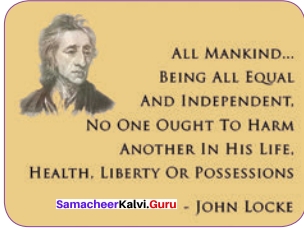
சுதந்திரம் என்பது தனி நபரைச் சார்ந்தது மட்டும் அல்ல. அது ஒரு பொதுக் கோட்பாடு ஆகும். இதில் நம் உரிமைகளை பொருந்தச் செய்யவேண்டும். தனிப்பட்ட சுதந்திரக் கோட்பாடுகள் வேறு எவரின் சுதந்திரத்தையும் பாதிப்பதில்லை. இந்த நாட்டில் ஒருவர் தன் மனம் செல்லும் வழியில் செல்ல யாரிடமும் உத்தரவு கேட்பதில்லை. உதாரணத்திற்கு ஒருவர் எந்த மதத்தையும் பின்பற்றலாம் அல்லது கறுப்பு நிறத்தவரையோ, வெள்ளை நிறத்தவரையோ திருமணம் செய்து கொள்ளலாம். அவர் தலைக்கு சாயம் அடித்துக் கொள்ளலாம். எதுவாயினும் செய்யலாம். இந்தச் செயல்கள் அடுத்தவரின் சுதந்திரத்தைப் பாதிப்பதில்லை. ஆனால் இந்த தனிப்பட்ட சுதந்திர வட்டத்தை விட்டு வெளியேறும் போது மற்றவரின் சுதந்திரத்தை மதித்து அனுமதிக்க வேண்டியுள்ளது. அதாவது ஒருவர் கிடார் (guitar) வாசிக்க விரும்பலாம். ஆனால், அடுத்தவரின் சுதந்திரத்தை அனுசரிக்கும் வகையில் தன் சுதந்திரம் இருக்க அவர் மெதுவாக வாசிக்க வேண்டும். பெரும்பான்மையான மக்கள் இதை மறந்து விடுகிறார்கள். அடுத்தவர் குறையைக் காணும் மக்கள் தன் குறையை மறந்து விடுகிறார்கள். அடுத்தவரின் உரிமை அல்லது உணர்வுகளுக்கு இடமளிப்பதே சமூக நடத்தையின் அடித்தளம் ஆகும்.
எளியவருக்கும், வலியவருக்கும் ஒரே விதி:
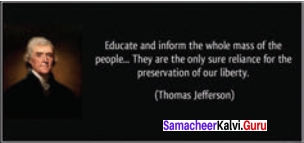
சிறிய நாடுகளில் வாழும் மக்களைப் போன்ற சிறுபான்மைப்பட்ட மக்களின் விதிகளும், உரிமைகளும் முக்கியமானதே. கார்டினர் (Gardiner) ஜெர்மனி நாடானது பெல்ஜியத்தின் மேல் போர் தொடுத்ததை வன்மையாகக் கண்டிக்கிறார். இரண்டாம் உலகப் போரின் போது சிறுபான்மையான மற்றும் போதிய இராணுவ வசதிகள் இல்லாத பெல்ஜிய நாட்டை பெரும் இராணுவப் படையுடைய ஜெர்மனி தன் வசப்படுத்தியது. சில மக்கள் மற்றும் உலக நாட்டவரின் ஆக்ரமிக்கும் குணம் மற்றும் அகங்காரம் குறித்தும் ஆசிரியர் விமர்சனம் செய்கிறார். அவர்களை நாகரிக உலகத்தின் வெறுக்கத்தக்க இனம் எனக் குறிப்பிடுகிறார்.
சிறிய நடவடிக்கை கொடுத்த பெரிய விளைவு:
சிறிய சிறிய நம் செயல்கள் பெரிய தாக்கத்தை உருவாக்குகின்றன. இத்தகைய சிறிய செயல்களான விதிமுறைகளைக் கடைப்பிடிப்பது அல்லது | தவிர்ப்பது வழியாகவே நாம் நாகரிகமானவரா அல்லது (நாகரிகமற்றவரா என வரையறுத்துக் கொள்ளலாம். | இத்தகைய சிறிய பொது இடக் கோட்பாடுகளே நம் பெரும்பான்மையான வாழ்வை இனிமையாக்குவது அல்லது கசப்பாக்குவது என்பதை முடிவு செய்கின்றன. இத்தகைய சிறிய பொது இடக் கோட்பாடுகளே நம் பெரும்பான்மையான வாழ்வை இனிமையாக்குவது அல்லது கசப்பாக்குவது என்பதை முடிவு செய்கின்றன.
![]()
முடிவுரை:
சாலை விதிகளைக் கடைபிடிப்பதன் மூலம் சமூக அராஜகத்தை எப்படி தடை செய்யலாம் என்பதை ஏ.ஜி. கார்டினர் சுவாரஸ்யமான உதாரணங்களுடன் விளக்குகிறார். ஒரு வழியில், சாலையின் விதிகள் கடைபிடிக்கப்படுவது ஒரு சமூக ஒழுங்கைத் தக்கவைத்துக் கொள்வது மட்டுமல்லாமல், சாலையில் விபத்துகள் ஏற்படுவதை தடுக்கவும், சங்கடமான போக்குவரத்து நெரிசலைத் தடுக்கவும் உதவுகிறது.
On the Rule of the Road Glossary
Textual:
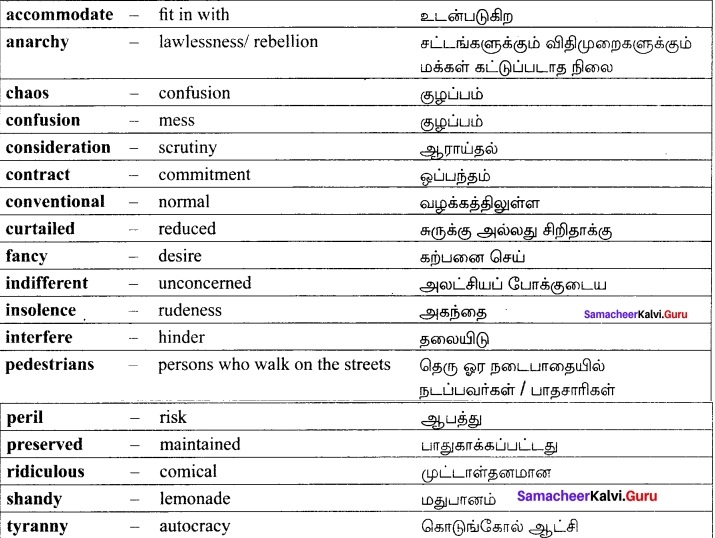
Additional:

On the Rule of the Road Synonyms
Find out the synonym of the underlined word in each of the following sentences.
Question 1.
A stout old lady walking down the middle of the street caused great confusion.
(a) vision
(b) clarity
(c) mess
(d) mesh
Answer:
(c) mess
Question 2.
She caused great peril to herself.
(a) safety
(b) frill
(c) shrill
(d) danger
Answer:
(d) danger
Question 3.
One who walks on the pavement is called,
(a) stalker
(b) walker
(c) pedestrian
(d) martian
Answer:
(c) pedestrian
![]()
Question 4.
We have got liberty now.
(a) tyranny
(b) freedom
(c) avarice
(d) slavery
Answer:
(b) freedom
Question 5.
The end of such liberty would be universal chaos.
(a) brotherhood
(b) love
(c) peace
(d) confusion
Answer:
(d) confusion
Question 6.
Individual liberty would become social anarchy.
(a) cooperation
(b) vanity
(c) civility
(d) lawlessness
Answer:
(d) lawlessness
Question 7.
Liberties of all may be preserved.
(a) excluded
(b) severed
(c) maintained
(d) pointed
Answer:
(c) maintained
Question 8.
The liberties of everybody must be curtailed.
(a) enhanced
(b) increased
(c) levelled
(d) reduced
Answer:
(d) reduced
Question 9.
He is a symbol of tyranny.
(a) plutocracy
(b) democracy
(c) aristocracy
(d) autocracy
Answer:
(d) autocracy
Question 10.
We may choose to be wise or ridiculous.
(a) serious
(b) funny
(c) earnest
(d) critical
Answer:
(b) funny
Question 11.
You can be conventional or odd.
(a) common
(b) usual
(c) strength
(d) popular
Answer:
(c) strength
Question 12.
If I play trombone in my bedroom, my family will object.
(a) accept
(b) approve
(c) oppose
(d) oppese
Answer:
(c) oppose
Question 13.
Liberty is a social contract.
(a) contact
(b) encounter
(c) confront
(d) agreement
Answer:
(d) agreement
![]()
Question 14.
I have to accommodate the interests of others.
(a) reject
(b) decline
(c) accomplish
(d) fit in with
Answer:
(d) fit in with
Question 15.
A reasonable consideration for the rights or feelings of others is the foundation of social conduct.
(a) thoughtfulness
(b) rejection
(c) confrontation
(d) argument
Answer:
(a) thoughtfulness
On the Rule of the Road Antonyms
Find out the antonym of the underlined word in each of the following sentences.
Question 1.
A stout old lady was walking.
(a) fat
(b) obese
(c) brittle
(d) lean
Answer:
(d) lean
Question 2.
We’ve got liberty now.
(a) freedom
(b) slavery
(c) right
(d) democracy
Answer:
(b) slavery
Question 3.
Such liberty would be universal chaos.
(a) disorder
(b) confusion
(c) order
(d) mess
Answer:
(c) order
Question 4.
Individual liberty would have become social anarchy.
(a) order
(b) disorder
(c) confusion
(d) mess
Answer:
(a) order
Question 5.
Liberties of all may be preserved.
(a) conserved
(b) damaged
(c) retained
(d) maintained
Answer:
(b) damaged
![]()
Question 6.
The liberties of everybody must be curtailed.
(a) reduced
(b) constrained
(c) restricted
(d) increased
Answer:
(d) increased
Question 7.
The policeman is not a symbol of tyranny.
(a) democracy
(b) autocracy
(c) plutocracy
(d) aristocracy
Answer:
(a) democracy
Question 8.
If you are a reasonable person, you would understand liberty.
(a) sound
(b) fair
(c) logical
(d) unreasonable
Answer:
(d) unreasonable
Question 9.
I have the liberty to be indifferent to you.
(a) caring
(b) disinterested
(c) heedless
(d) unconcerned
Answer:
(a) caring
Question 10.
We may choose to be harsh or easy.
(a) rude
(b) soft
(c) rough
(d) severe
Answer:
(b) soft
Question 11.
I have to accommodate my liberty to other’s liberties.
(a) adjust
(b) hinder
(c) fit in with
(d) give up
Answer:
(b) hinder
Question 12.
We are conscious of much more imperfections of others than of our own.
(a) frailties
(b) follies
(c) perfections
(d) shortcomings
Answer:
(c) perfections
Question 13.
A reasonable consideration for the rights or feelings of others is the foundation of social conduct.
(a) thoughtfulness
(b) heedfulness
(c) heedlessness
(d) sensitivity
Answer:
(c) heedlessness
Question 14.
I must not interfere with their liberty to sleep in quiet.
(a) solemnity
(b) quietude
(c) tranquillity
(d) noise
Answer:
(d) noise
Question 15.
The lady walked down the middle of the road with great peril to herself.
(a) danger
(b) safety
(c) horror
(d) criticality
Answer:
(b) safety